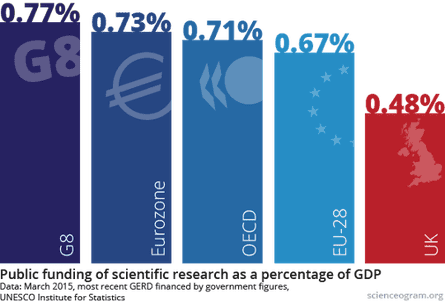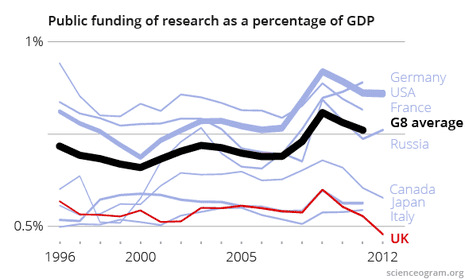Five years ago, scientists were roused from their labs and took to the streets with supporters of science from all walks of life – from teachers and doctors to plumbers and taxi drivers – to protest against the coalition’s threatened cuts to the UK research budget. The protest wasn’t about jobs for scientists: it was to make the case for the central role we know that research plays in keeping our economy healthy. Any short-term gains extracted from raiding the science budget would ultimately end up weakening Britain’s ability to compete in a world where success is increasingly knowledge-based.
From this campaign, Science is Vital – the grassroots organisation we and others coaxed into life – was born. The protest, coordinated closely with the Campaign for Science and Engineering (CaSE) and combined with arguments made by industry, learned societies and others, staved off cuts and secured a flat-cash settlement. And over the last five years, we have watched as the science budget flagged in real terms.
But we never dreamt it would be quite as bad as it now appears to be.
We have analysed the latest international data on government spending and found that the UK investment in public-funded research dropped to less than 0.5% of GDP in 2012 – its lowest point in over two decades. Since 2010, when the Treasury froze the science budget disbursed annually to universities and research institutes by the Department of Business, Innovation and Skills (BIS), inflation, cuts to capital spending on facilities and reductions in research spending by other government departments have clearly taken a serious toll.
In fact, this steady decline since 2009 puts us firmly at the bottom of the G8 group of countries in terms of government support for science.
It hasn’t all been bad news. Throughout this parliament, former science minister David Willetts, Chancellor George Osborne and even the Prime Minister, David Cameron, have all made repeated assurances that they want Britain to be the best place in the world to do research. There have been high-profile announcements of additional injections of cash in the past several years (for example, the £200m centre for advanced materials research announced in the 2014 Autumn Statement). The government’s strategic commitment to investing £6 billion in new facilities and equipment over the period 2016–2021 has also been encouraging. However, the fine words and the commitment to capital spending sit uneasily beside the steady drop in the budgets that pay for the running costs of public R&D. If this erosion of funding is allowed to continue, Britain’s world-leading research capabilities are likely to degenerate.
The new figures show that UK is faring badly in comparison to every major group of countries in the world, putting it behind averages for the OECD, the eurozone and even the full 28 member states of the EU.

There are caveats to measuring public-funded science purely as a fraction of GDP – every economy is different, and it’s tempting to oversimplify. It’s often pointed out, for example, that the UK has a very efficient research base, and tends to produce more, and more highly cited publications than our relatively low investment might suggest. However, if budgets continue to decline, the efficiency and success of the system will inevitably buckle. And, whatever the limitations of this kind of analysis, it’s pretty clear that the UK should aspire to be somewhere other than at the bottom of the league table, and falling. That’s bad news for the UK since recent studies have shown that science is an investment which offers a double-digit annual return and bolsters any economy that fosters it.
Science and technology are also critical if we are to face the challenges looming on the horizon, such as climate change, an ageing population and antibiotic resistance. Medical research is vital to the health of the nation and yet we spend just pennies per person per year researching serious and deadly diseases like stroke and dementia.
In view of the emergence of this disturbing picture of Britain’s declining science budget just before the General Election, Science is Vital has launched a new campaign, ‘Tell Them Science is Vital’. We want to make sure that the case for science is heard in hustings and on doorsteps up and down the country. Inadequate research funding is bad for the health and wealth of the UK, and we’re asking anyone who supports science to contact their local MP and parliamentary candidates. Let them know how important research is to you and your community.
Whether you are a practising scientist, a patient benefiting from medical research, passionate about the environment, or have another reason entirely that you think science is vital, get involved! We’ve done the research to help you make the case to our politicians, with posters and a leaflet outlining the importance of research, and how current funding levels are letting the UK down.
With the General Election just weeks away, it is more important than ever that we let the political parties know the importance of funding for research. Whilst science funding might not be the final arbiter of how you cast your vote, there is an urgent need for wider public debate about investment in science.
We hope that these new, shocking figures can help stoke that debate.
Dr Jenny Rohn is Chair, and Prof. Stephen Curry and Dr Andrew Steele are Vice-Chairs of Science is Vital. Find out more about the new campaign and how to get involved at bit.ly/tellthemSiV. Full details of our analysis of research funding can be found at Scienceogram.
